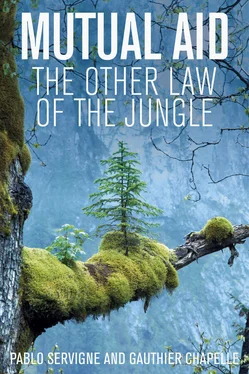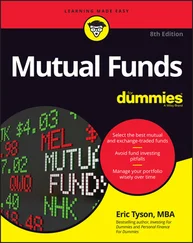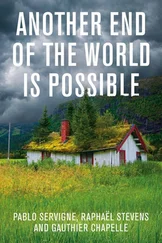This book was born from the idea of exploring the conditions for the emergence of behaviour based on the idea of mutual aid. The initial spark – a scientific curiosity going back more than ten years – has recently been fanned by the drive to make contact with another mythology, to expand and enrich another way of imagining things, and to tell captivating stories deeply rooted in the evolution of living creatures. For we hope thereby to minimize the damage caused by this spiral of self-destruction and violence, and – why not? – to foster a virtuous spiral rather than a vicious circle.
The emergence of another law of the jungle
We are neither the only nor the first writers to think about mutual aid. In recent years, scientific articles on this subject have followed one another at a breakneck pace. But unfortunately they remain relatively inaccessible to the general public and are rarely found in school curricula. The same goes for the long philosophical and religious intellectual lineage which dates back to Antiquity and took on a truly scientific dimension in the nineteenth century in the writings of, among others, the naturalist Charles Darwin, the sociologist Alfred Victor Espinas, the geographer Peter Kropotkin and the anthropologist Marcel Mauss.
Make no mistake: the heirs of these ‘naïve’ ideas are numerous. One need only think of the MAUSS movement, 3which was launched in 1981 by Alain Caillé and currently brings together a large panel of intellectuals under the (very stimulating!) banner of convivialism . 4There is also the naturalist overview by Jean-Marie Pelt, La solidarité chez les plantes, les animaux, les humains ( Solidarity in Plants, Animals, and Humans , 2004), as well as the monumental syntheses in Jacques Lecomte’s La Bonté humaine ( Human Kindness , 2012), Matthieu Ricard’s Altruism: The Power of Compassion to Change Yourself and the World (2015) and Pierre Dardot and Christian Laval’s Common (2019). Philosophers, managers, ecologists, economists, anthropologists and sociologists are scrambling to bring back to the forefront concepts as oldfashioned and outdated as altruism, 5goodness, 6kindness, 7association, 8equality, 9common goods, 10empathy 11and solidarity. 12
The strength of this newly emerging, wide-ranging intellectual trend is that it doesn’t just stay in libraries. It goes out into the streets, transforms the world through new modes of consumption, labour, construction, learning, communication, management 13and production. 14The emergence of a culture of common goods, peer-to-peer contact and collaboration is taking on a global dimension affecting every sector. It’s too late to stop it.
In the last century, our world became extremely efficient in terms of the mechanisms of competition. It’s high time to become equally proficient in cooperation, benevolence and selflessness. The other objective of this book is to add a stone to this edifice, to participate in the structuring of this new culture. Drawing on several disciplines, from ethology to anthropology, including economics, psychology, biology, sociology and neuroscience, we offer an overview of the most recent discoveries relating to the very powerful drive among living creatures (and not just humans) to form associations. The idea of including the rest of the living world in our synthesis was so that we could identify the overall principles and a general architecture of what might now be called ‘the other law of the jungle’.
The construction site of the new century
We were surprised to see what an incredible diversity of processes, feelings and mechanisms has been at work since the beginnings of time. But what name are we to give this infinitely complex, rich and colourful world – this tendency which describes both an association between bacteria and an agreement between humans or great apes, involving feelings as subtle as altruism, kindness, friendship, gratitude, reconciliation and a sense of justice? We needed a term that included both actions and intentions, but also all living organisms and all processes.
We have chosen the term mutual aid , aware that it is not defined in the same way by everyone, and that it can sometimes involve a hint of anthropomorphism, especially when it comes to describing the behaviour of living creatures that are nothing like us. But today this term has the advantage of being both accepted in everyday language and sufficiently forgotten in science to be immune from too narrow a definition. It is also, and above all, a nod to the great geographer and anarchist Peter Kropotkin, one of the pioneers of this scientific adventure, who in 1902 wrote a remarkable synthesis, Mutual Aid . 15
The subject is obviously colossal. Each chapter of our book could be the subject of a multi-volume treatise! The goal was not to turn it into an encyclopaedia, but to build bridges between disciplines, and in particular between the human sciences and the biological sciences. Seeing their disciplines being given such a broad-brush treatment will obviously frustrate the specialists – we share their feelings, as we would have liked to share even more extraordinary details of the mechanisms of living creaturses. 16
We started this project a dozen years ago, with as much enthusiasm as naïvety. Our ‘biological’ label 17had not prepared us to absorb the incredible advances in the human sciences, nor the paradoxes that were emerging from this vast wealth of new discoveries. 18Exploring all of this was a real adventure which only stoked our curiosity the more. Our conclusions are therefore far from definitive, and ultimately turn out to be an invitation to continue exploring.
This book is not a treatise on collapsology, nor a critique of consumer society and capitalism, nor a naturalistic encyclopaedia or a philosophical treatise. It’s an attempt to tie it all together and indicate a route for our generation.
We will begin our journey by demolishing the myth of an aggressive nature ruled by one sole law. Then, over the course of the chapters, we will discover the mechanisms and subtleties of human mutual aid. Finally, we will return to the whole of the living world, which will allow us to touch on some major principles of life on earth.
1 1. For the moment, the industrialized countries have been relatively spared, but only thanks to the fragile protection afforded by technology – a protection which depends on diminishing energy and mineral resources.
2 2. P. Servigne and R. Stevens, How Everything Can Collapse: A Manual for Our Times, trans. A. Brown (Cambridge: Polity, 2020).
3 3. MAUSS stands for Mouvement anti-utilitariste dans les sciences sociales (Anti-utilitarian Movement in the Social Sciences). See the foreword to the present book as well as the Revue du MAUSS website ( www.revuedumauss.com.fr/Pages/ABOUT.html).
4 4. See The Convivialist Manifesto ( www.gcr21.org/publications/gcr/global-dialogues/convivialist-manifesto-a-declaration-of-interdependence) and the convivialists’ website ( http://convivialisme.org/worldwide/).
5 5. P. Kourilsky, Le Temps de l’altruisme (Paris: Odile Jacob, 2009); P. Kourilsky, Le Manifeste de l’altruisme (Paris: Odile Jacob, 2011); M. Ricard, Altruism: The Power of Compassion to Change Yourself and the World, trans. C. Mandell and S. Gordon (New York: Little, Brown and Company, 2015); M. Ricard and T. Singer (eds), Caring Economics: Conversations on Altruism and Compassion (London: Macmillan, 2015).
6 6. J. Lecomte, La Bonté humaine: altruisme, empathie, générosité (Paris: Odile Jacob, 2012).
7 7. E. Jaffelin, Petit Éloge de la gentillesse (Paris: J’ai lu, 2010); F. Martin, Le Pouvoir des gentils: les règles d’or de la relation de confiance (Paris: Eyrolles, 2014).
Читать дальше












